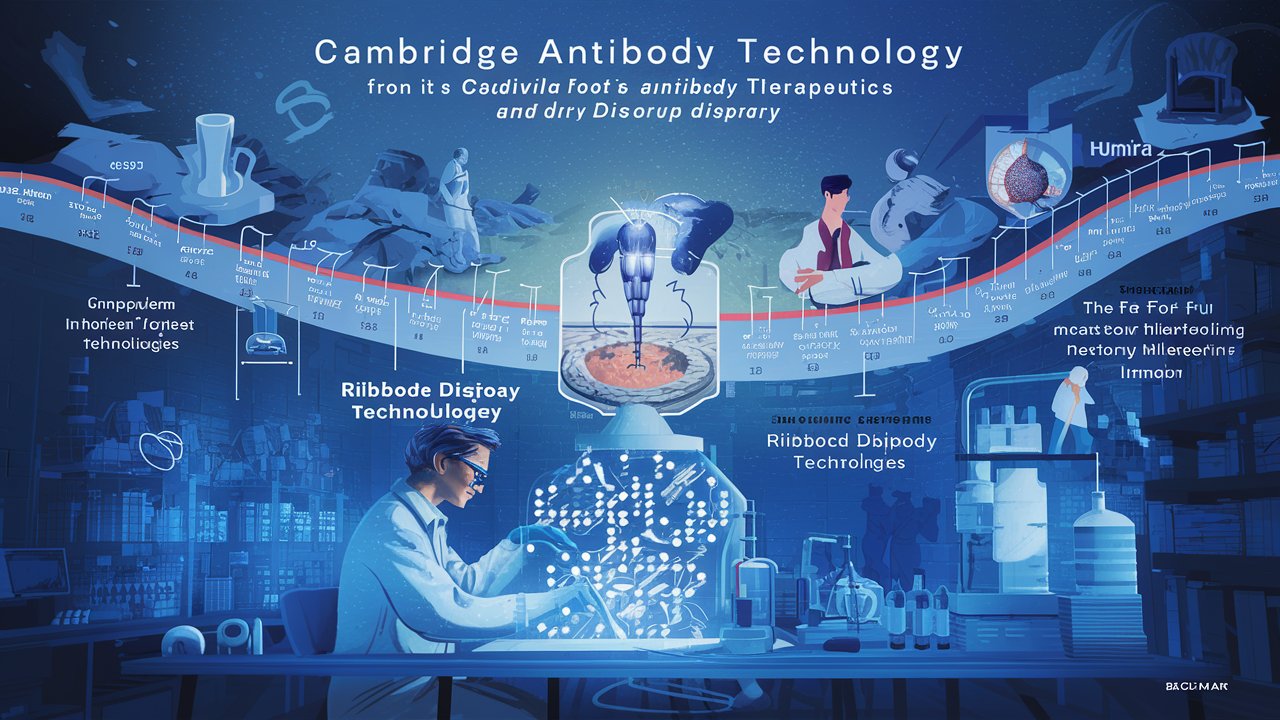Table of Contents
journey of Cambridge Antibody Technology (CAT) from its academic roots to becoming a leader in antibody therapeutics and drug discovery.
Cambridge Antibody Technology (CAT) is a pioneer in the biotechnology field, focusing on the discovery and development of monoclonal antibodies. This technology represents a leap forward in how we treat a wide array of diseases, from cancer to autoimmune conditions, by harnessing the body’s immune system to fight illness more effectively.
History and Founding of Cambridge Antibody Technology

Founded in 1990, CAT emerged from collaborative efforts among esteemed institutions, including the Medical Research Council’s Laboratory of Molecular Biology. The company quickly made its mark by focusing on innovative antibody engineering technologies, setting a new course for therapeutic discoveries.
Key Technologies: Phage Display and Ribosome Display
At the heart of CAT’s success are two groundbreaking technologies: phage display and ribosome display. These methods revolutionized the way scientists identify and produce therapeutic antibodies, allowing for the rapid screening and optimization of antibodies against virtually any target.
Success Story: Humira and the Rise of Antibody Therapeutics
Perhaps CAT’s most notable achievement is the development of Humira, the world’s first fully human monoclonal antibody drug approved for treating rheumatoid arthritis, among other conditions. Humira’s success exemplifies the potential of antibody therapeutics and has spurred significant advancements in the field.
Acquisition by AstraZeneca and Integration with MedImmune
In 2006, Cambridge Antibody Technology was acquired by AstraZeneca, a global pharmaceutical giant. This move integrated CAT’s expertise with AstraZeneca’s MedImmune division, bolstering their capabilities in biologics and contributing to the development of new therapeutic agents.

Impact on the Biopharmaceutical Industry
CAT’s innovations have profoundly impacted the biopharmaceutical industry, leading to more targeted and effective treatments. Their technologies have paved the way for the rapid growth of the antibody therapeutics market, transforming patient care and opening new avenues for drug development.
Applications of CAT’s Technologies: Beyond Antibody Discovery
Beyond traditional antibody discovery, CAT’s technologies are now being applied in various fields, including vaccine development and diagnostic tools, showcasing their versatility and potential to address unmet medical needs.
Recent Developments and Future Outlook
In recent years, the legacy of CAT’s technology continues to evolve, with ongoing research aimed at enhancing antibody engineering and discovery processes. The focus on developing more precise, effective treatments promises a bright future for biopharmaceuticals.
Certainly! Let’s refine the content to align more closely with your specific headings and instructions, focusing on creating an informative and engaging narrative. Get More Info Cambridge Antibody Technology.
From Academic Innovation to Industry Leader: The Birth of CAT

Cambridge Antibody Technology (CAT) began as a visionary endeavor in the early 1990s, rooted deeply in academic research. Born out of a collaboration between scientific scholars and research institutions, CAT’s foundation was built on the premise that antibody technologies could revolutionize medical treatment. This pioneering spirit quickly positioned Cambridge antibody technology group plc as an industry leader, in translating complex scientific concepts into groundbreaking medical solutions.
Paving the Way: Phage Display and Ribosome Display Revolutionize Drug Discovery
Cambridge Antibody Technology AstraZeneca technological advancements, notably phage display and ribosome display, became cornerstones in the field of drug discovery. These techniques allowed for the rapid screening and identification of antibodies with high specificity and affinity, revolutionizing the process of therapeutic drug development. By enabling scientists to quickly find and optimize antibodies against a vast array of targets, CAT set new standards for efficiency and effectiveness in the development of treatments.
A Blockbuster is Born: Humira and the Power of Antibody Therapeutics
The success of Humira, developed by Cambridge antibody technologies underscored the immense potential of antibody therapeutics. As the first fully human monoclonal antibody drug approved by regulatory agencies, Humira represented a monumental achievement in the treatment of autoimmune diseases, including rheumatoid arthritis. Its unparalleled success not only transformed the lives of millions of patients worldwide but also validated the power of antibody-based therapies, marking a new era in medicine.
A Strategic Alliance: AstraZeneca’s Acquisition and MedImmune’s Integration
The acquisition of Cambridge antibody technology group by AstraZeneca in 2006 and the subsequent integration of CAT’s operations with AstraZeneca’s MedImmune division marked a significant milestone in the biopharmaceutical industry. This strategic alliance leveraged CAT’s innovative antibody technology and MedImmune’s resources and expertise, accelerating the development of new therapeutic agents. The partnership exemplified how collaborations between different sectors of the pharmaceutical industry could enhance the capacity for medical innovation, leading to the creation of more effective and targeted treatments.
Final Thoughts
Cambridge Antibody Technology has left an indelible mark on the biopharmaceutical landscape. Its legacy, characterized by innovation and the relentless pursuit of groundbreaking therapies, continues to influence and inspire advancements in medical science, ensuring its place in history as a beacon of therapeutic discovery and development.
FAQs:
What is Cambridge Antibody Technology?
Cambridge Antibody Technology (CAT) specializes in developing monoclonal antibodies for treating various diseases, leveraging innovative technologies like phage display.
What is phage display?
Phage display is a method used by CAT to screen and identify antibodies with high specificity for drug development.
What is Humira?
Humira, developed by CAT, is the first fully human monoclonal antibody drug approved for treating autoimmune diseases, showcasing the potential of antibody therapeutics.

Jasper Bruxner is a passionate and versatile blogger with a keen eye for trends and a knack for crafting engaging content. As the founder of WendyWaldman.com, he has established himself as a trusted resource in a diverse range of niches, including food, tech, health, travel, business, lifestyle, and news. He tends to share the latest tech news, trends, and updates with the community built around Wendywaldman. His expertise and engaging writing style have attracted a loyal following, making him a respected voice in the online community.




